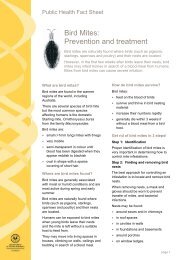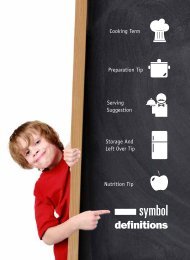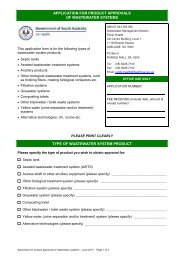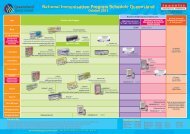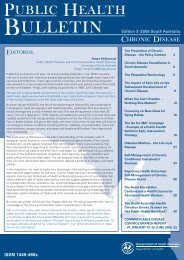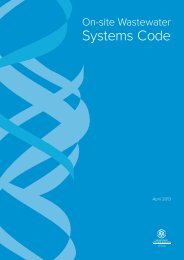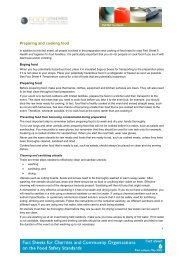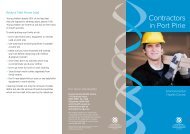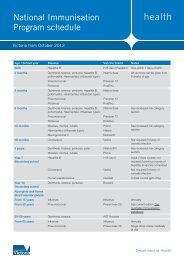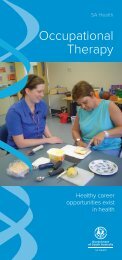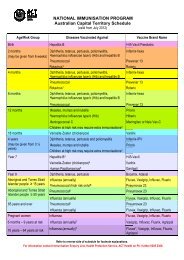Food Act Report 2009/2010 - SA Health - SA.Gov.au
Food Act Report 2009/2010 - SA Health - SA.Gov.au
Food Act Report 2009/2010 - SA Health - SA.Gov.au
Create successful ePaper yourself
Turn your PDF publications into a flip-book with our unique Google optimized e-Paper software.
<strong>Food</strong> Safety Week<strong>Food</strong> Safety Week is a national event organized organised by the <strong>Food</strong> Safety Information Council, a government–industry body. The <strong>Food</strong> Safety Information Council (FSIC) is Australia’s leading disseminator of consumer-targetedfood safety information.The theme for November <strong>2009</strong> was Safe <strong>Food</strong> – Smart and Great Value. <strong>SA</strong> <strong>Health</strong> and Adelaide City Council staffworked on an information display in Rundle Mall for two days and did a number of media activities to promote foodsafety information to the community.The FSIC’s basic food safety targets were:• Avoid the temperature danger zone – serve hot food steaming hot. Put leftovers into the fridge as soon as theystop steaming. Chill all food as soon as possible after cooking or buying. Make sure your fridge is clean, unclutteredand 5°C or below. Ask for ice when buying seafood.• Cook chicken, rabbit, s<strong>au</strong>sages, minced meat dishes, hamburgers, rolled and stuffed meats right through, until thejuices run clear.• Separate foods that are raw such as chicken, meat and dirty vegetables from foods that are ready to eat such assalads, cooked meats etc. Make sure raw chicken and meat are stored below other foods in the fridge to avoidcross contamination.• Keep cooking utensils and all surfaces your food will touch scrupulously clean to avoid contamination with foodpoisoning bacteria and viruses.• Clean your hands. Hands should be washed with soap under warm, running water for 20 seconds and dried for20 seconds.The department also made available a $500 grant to councils that developed innovative ways to communicate the<strong>Food</strong> Safety Week theme to their constituents. The councils that were successful in obtaining the grants were:• Holdfast Bay – promoted the <strong>Food</strong> Safety Week via their website, cooking tips and food safety tips• Tumby Bay – arranged barbeques and information sessions• Charles Sturt – prepared two informal morning teas to educate communities about food safety and healthy choices• Marion – community education event barbeques• Alexandrina – organised information sessions (healthy eating) for staff and communities• Adelaide – joint information stand in the mall with <strong>SA</strong> <strong>Health</strong>• Whyalla – produced a cooking hand book and a food safety brochure• Adelaide Hills – arranged for a food safety information presentation with guest speaker• Eastern <strong>Health</strong> Authority – staff worked on an information display in Northpark Shopping Centre and providedfood safety information to communities.Communication and consultationTo facilitate communication and consultation with stakeholders, the department used a number of differentmechanisms this year:<strong>Food</strong> Regulation Inter-Departmental CommitteeThe <strong>SA</strong> <strong>Gov</strong>ernment <strong>Food</strong> Regulation Interdepartmental Committee (IDC) was established in October 2005 tofacilitate improved communication and consultation between relevant government organisations regarding foodregulation matters.The South Australian government departments represented are:• Department of <strong>Health</strong> (chair, secretariat)• Department of Premier and Cabinet• Department of Primary Industries and Resources South Australia• Department of Trade and Economic Development• Attorney General’s Department – Office of Consumer and Business Affairs.page 21<strong>Food</strong> <strong>Act</strong> <strong>Report</strong> Year ending 30 June <strong>2010</strong>



